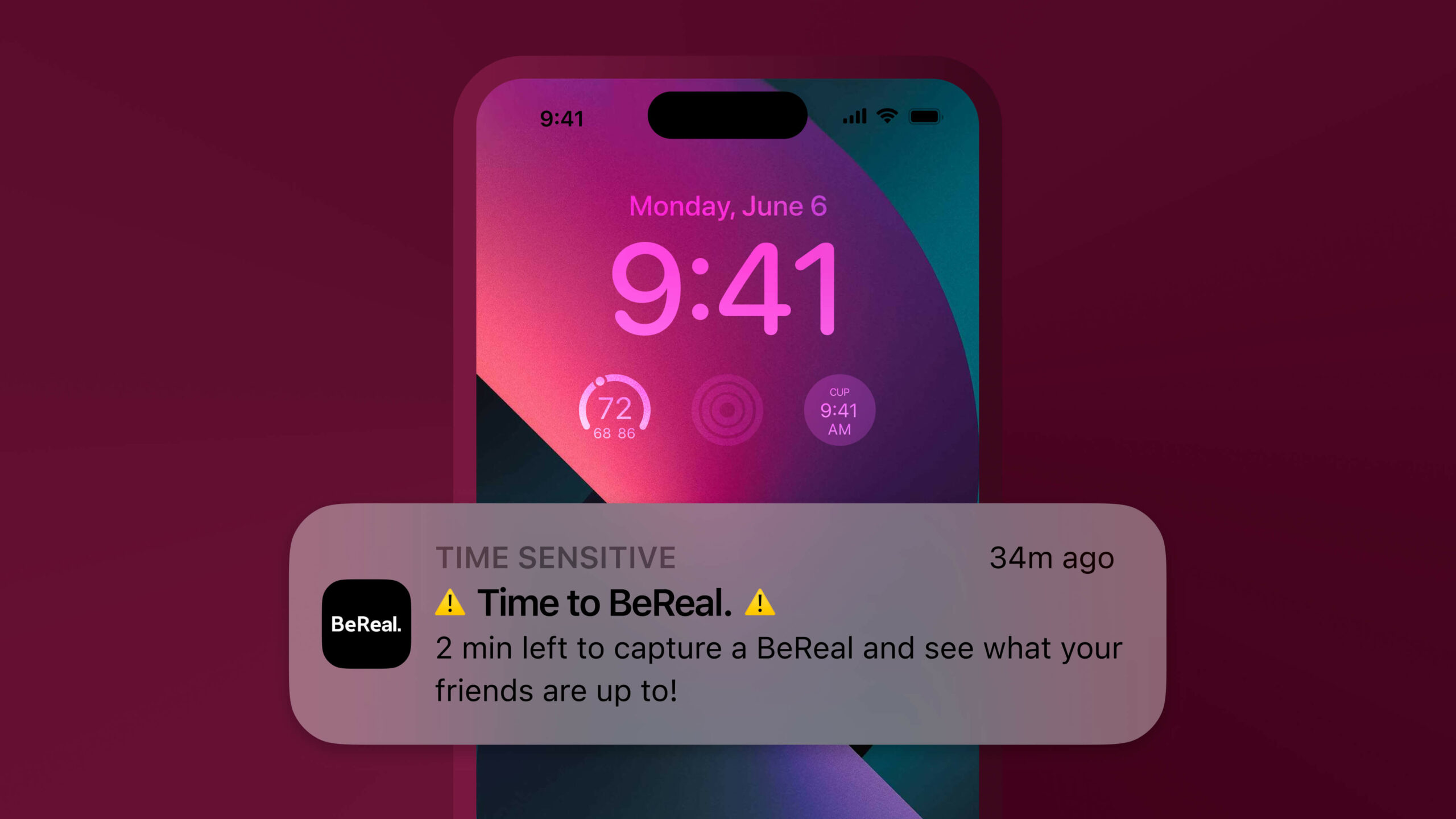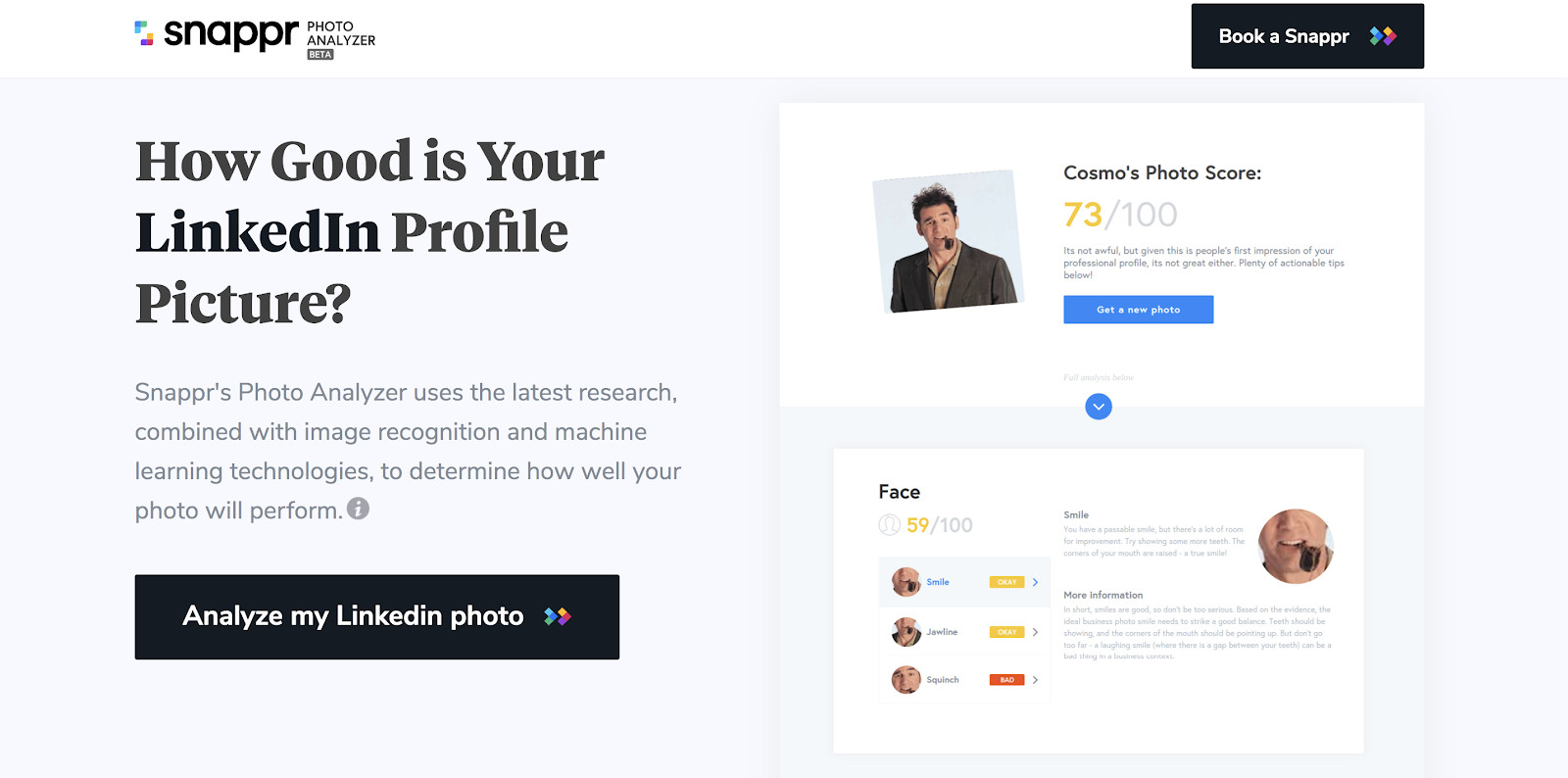
3 Steps to Grow Your Business Without Busting Your Budget
Growth hacking is for everyone — whether you’re operating a big company or a small startup. Why is it so popular? Three big reasons: Growth hacking is affordable, measurable, and— most importantly— effective.
In this post, we’ll teach you what growth hacking is and show you the exact steps to grow your business without busting your budget. We’ll also share with you a real life case study of how we helped Snappr, one of our own Raw.Studio clients, develop powerful and profitable growth hacks. With our proven methods, Snappr was able to hack their way to hundreds of thousands of views and soar to the coveted number 1 spot on ProductHunt (twice!). The methods we’ll discuss below have helped countless startups hack their way to success.
Table of Contents
Things to know beforehand
Where did growth hacking come from?
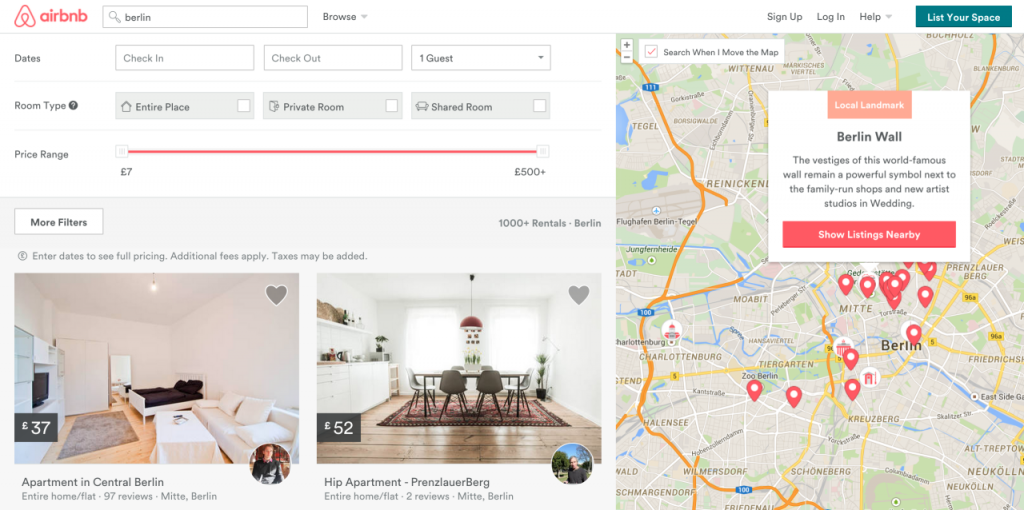
Take a look at web-based email service Hotmail. They grew by millions and gained a 20% market share within the span of a year and half thanks to one simple growth hack: They added a signature line to each user’s outgoing email. The line? “PS: I love you. Get Your free e-mail at Hotmail.” Nothing catches the eye like a declaration of love. This smart growth hack is one of the reasons why your grandmother has Hotmail ’til this day.
Or check out AirBnB’s infamous Craigslist growth hack. You may be familiar with this accommodation booking service now, but 10 years ago, when it was still building a name for itself, AirBnB created an unauthorized integration hack into Craigslist. This allowed AirBnB users to post their listings on Craigslist with one click.
File hosting service Dropbox used gamification to engage their users and activate referral marketing. Users were given more file storage (for free) when they promoted Dropbox on their social media pages. 500 million users later, I think it worked.
Your mission, if you choose to accept it, is to grow your business as quickly as you can while spending as little as you can. Is this mission impossible?
Absolutely not, but it ain’t easy. To growth hack successfully, you must shift away from the traditional marketing mindset and embrace clever schemes so crazy that they actually work. But where do you start? Start with this guide. 👇
We’ll also give you practical tips to help you create your own growth hacking strategy. Let’s get started.
Traditional marketing vs growth hacking
Even the funnels look different. Traditional marketers focus especially on raising awareness for a product. It’s their job to load the top of the funnel, and then hope that everything else will fall into place. Ideally, the right prospect will be interested in the product, want it, and take the desired action towards getting it. Traditional marketers favour the AIDA funnel:
- Awareness – Find prospects
- Interest – Teach them about your product
- Desire – Prospect trusts you and wants to do business with you
- Action – Prospect becomes a customer
Growth hackers have a different mindset. Instead of focusing entirely on the top of the funnel (i.e. awareness), growth hackers concentrate on all levels of their funnel, which includes:
- Acquisition – Introduce a prospect to your brand
- Activation – Get the prospect to try your product
- Retention – Keep the prospect engaged
- Revenue – Turn the prospect into a customer
- Referral – Turn the customer into a brand advocate
Growth hacking relies completely on experimentation. Instead of adopting the processes that have worked for others, a growth hacker uses data to create innovative, low-cost strategies to grow their business. And they do it quickly. Rapid experimentation is an important component of growth hacking. A growth hacker knows to analyze everything, test everything, and then go with whatever works.
Growth hacking in action (real case study)
Up until now, we’ve talked about the theory of growth hacking. That’s important but now let’s get to the good stuff. Without further ado, here’s how we sent Snappr soaring to #1 on ProductHunt, gaining the attention of hundreds of thousands of ‘techies’ who sit well within their target market.
Snappr is an on-demand professional photography booking service that was founded in Sydney in 2016. We spent over 3 years working closely with Snappr on all of their product designs. Snappr successfully went through the Y Combinator, raised $2.5 million in seed funding, and emerged as the fastest-growing startups. A big contributor to its growth was the Photo Analyzer feature that we created to attract interest.
The Photo Analyzer is a free photo analysis tool for use with LinkedIn.
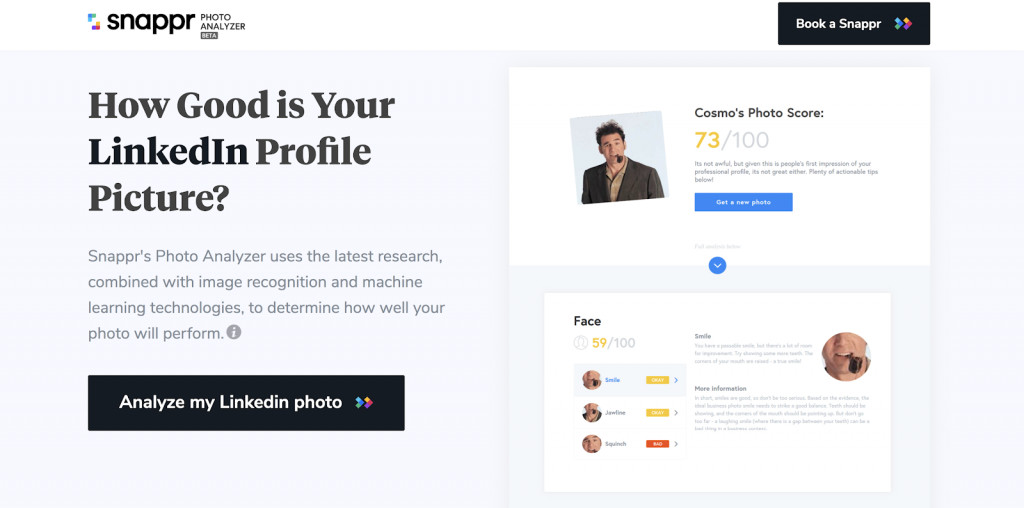
The concept is simple: A user logs into the LinkedIn account, gives the necessary permission, and then waits as the analyzer scans the user’s LinkedIn profile photo. The analyzer then grades the photo based on a set of criteria, including:
- Facial composition (type of smile, jawline definition, eye squinch)
- Overall composition (background, rule of thirds, zoom)
- Editing (brightness, contrast, sharpness, color temperature, etc.)
The analyser also provides research-based information to backup the grade.
Within the Photo Analyser are two important calls to action.
The first one is to book a photo-shoot now. That draws the audience into the Snappr product itself. This call to action raises awareness for Snappr and explains a little bit about the product to entice the user to learn more.
The second call to action is to share the analysed photo with your friends and colleagues on LinkedIn, Facebook, and Twitter.
Which one drives growth?
If you answered the second one, you get a gold star. Users immediately receive value from the Photo Analyzer and are then inspired to tell others about it. They share because they want to be perceived as a valuable resource to others.
Additional strategies you need to know
Growth hacking requires smart experimentation and it will always be unique to your product and what your data tells you about your customers. That said, there are a few tips that we can share with you that should apply to most businesses.
Let’s start by how we drove traffic to Snappr’s Photo Analyzer.
We used a well-known discovery website, Product Hunt, to market the Photo Analyzer. (Can I get a “yay” for no ad-spend?)
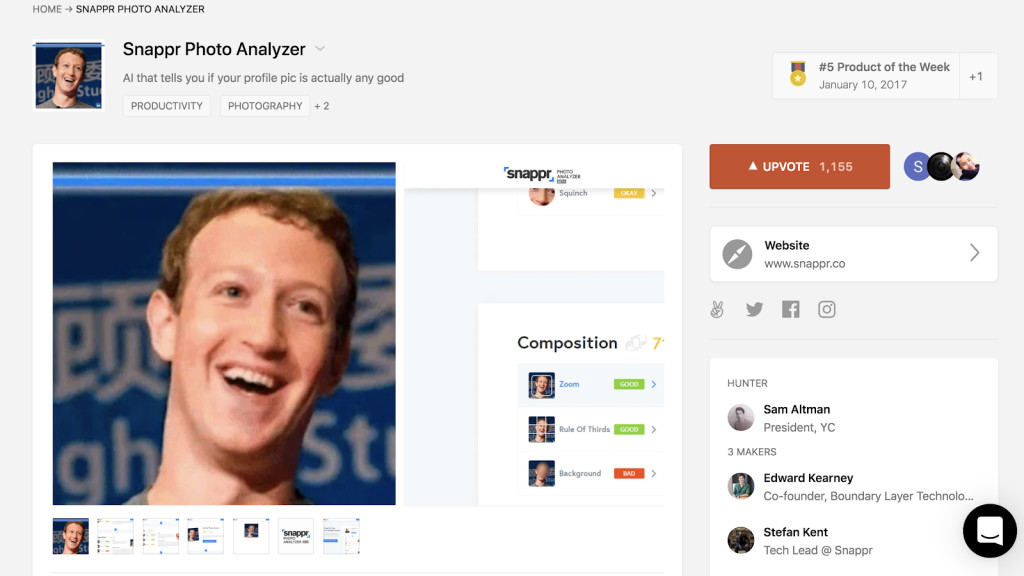
Using an attention-grabbing picture of Mark Zuckerberg, we launched on Product Hunt. It gained popularity and earned the prestigious “Product of the Week” award, partly because our team was active in the comments and engaged with other product hunters.
Building off our initial success with the Photo Analyzer, a year later we created another growth hack for Snappr— the Dating Photo Analyzer. This tool uses the same basic layout as the LinkedIn analyzer but it focuses on different aspects of the user’s chosen photo to determine if the photo will do well on sites like Tinder, Grindr, and OkCupid. Just like its LinkedIn predecessor, the Dating Photo Analyzer also encourages social sharing. The analysis results page also invites users to visit the Snappr home page.
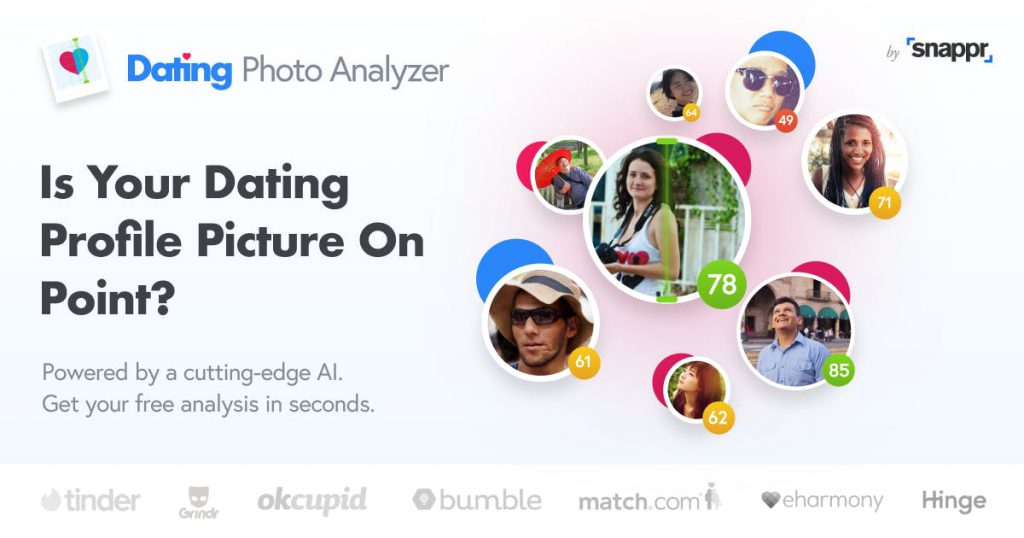
The Dating Photo Analyzer is a fun tool that’s easily shareable with friends and family, which is why it, too, was awarded Product of the Day (on Valentine’s Day, no less). Note that timing is everything when growth hacking. Be mindful of the calendar because it can affect the impact of your growth hack.
While your strategy may not follow the same path as the Photo Analyzer or the Dating spin off, keep these things in mind
1. Evaluate what you are doing well
Take a look at where you are currently. This can inform where you should start with your growth hacking strategy. Ask yourself:
- What are my top-performing social media channels?
- Which pages on my website get the most traffic?
- Which posts on my social media pages get the most likes?
- Where do my best customers come from?
- What immediate value can I offer my customers to start building a relationship with them?
Use this information to figure out where to begin your experiments.
2. Set a crazy but attainable growth hacking goal
To be effective, growth hacking must be tied to a goal— a S.M.A.R.T. goal. This acronym stands for:
- Specific – What would you like to accomplish with your growth hack? Get specific. Do you want to build awareness for your business? Acquire more users? Increase virality/ word of mouth?
- Measurable – What methods will you use to verify that you’re on track to meet your goal?
- Actionable – What specific steps can you take to achieve your goal?
- Realistic – Is it possible, with your time and budget, to achieve your goal? If not, create a goal that can be achieved within your parameters.
- Time-Based – Set a deadline for your goal.
So, that’s in the realm of theory. Now, let’s look at how we used a S.M.A.R.T. goal with Snappr’s Photo Analyzer.
Our specific goal was to build brand awareness for Snappr. We used traffic as a key metric. We quickly built the Photo Analyzer based on solid user data that pointed to a need for objective photo feedback.
Now, let’s see how the Photo Analyzer fits within the first three stages of the AARRR funnel:
Acquisition – The Photo Analyzer created a platform to acquire new prospective customers for Snappr’s photography booking service.
Activation – Prospects were then invited to engage with Snappr, beyond simply sharing the viral link with others.
Retention – Once on Snappr, prospects are encouraged to book a photographer immediately. Selecting this action takes the prospect through a series of questions to match them with a list of area photographers. In order to get the list, the user will enter their email address. This enables Snappr to stick around and continue building a relationship with the prospect.
3. Create a growth hacking action plan
Once you’ve created a goal and spotted a valid user need/ opportunity, start experimenting.
Go forth and growth hack
I highly recommend that every business consider growth hacking, even if you’re growth hacking on a smaller scale. Remember to set a goal and then allow your user data to guide you. Focus on results, try everything, and continue doing what works.
Need help? We’ll give you a free consultation on how to develop your own explosive growth strategy. Set up a meeting with us now.
Take your company to the next level and get results with our world class user experience, interface design and implementation.
Get a FREE 30 min Strategy Session

Related posts
7 UX Tips for eCommerce to Increase Conversions
UX has a pivotal role to play in increasing revenue. It is usually an overlooked aspect of the checkout process, […]
BeReal: 5 Ways the Anti-Social Media App is Changing the Game
Ding. A notification ⚠️ Time to BeReal ⚠️ There are now two minutes to open the app and hit the […]
Prototyping: A Startup Founder’s Secret to Success
We’ve had so many grass-root startups come up to us with an extraordinary product idea but don’t know where to […]
Creative product design that gets results
Take your company to the next level with world class user experience and interface design.
get a free strategy session


